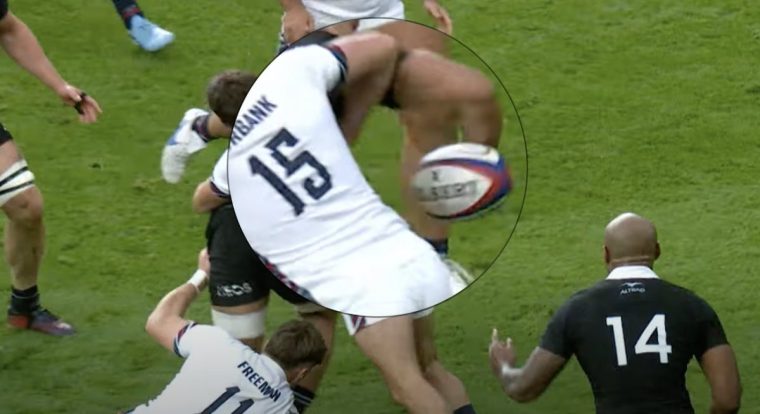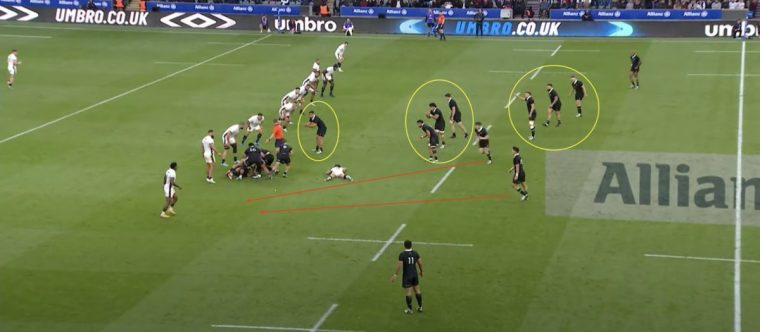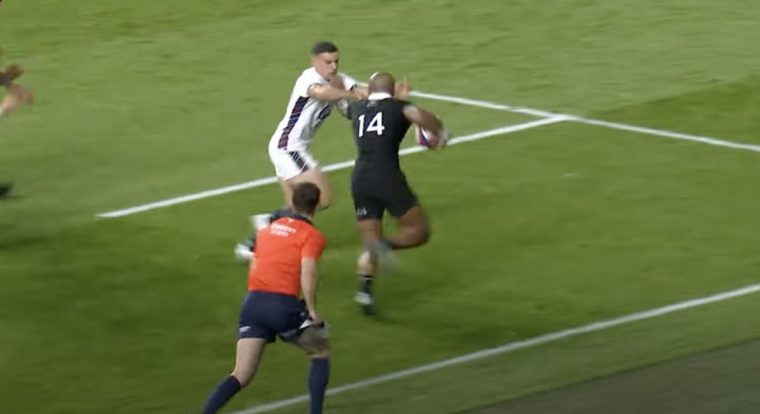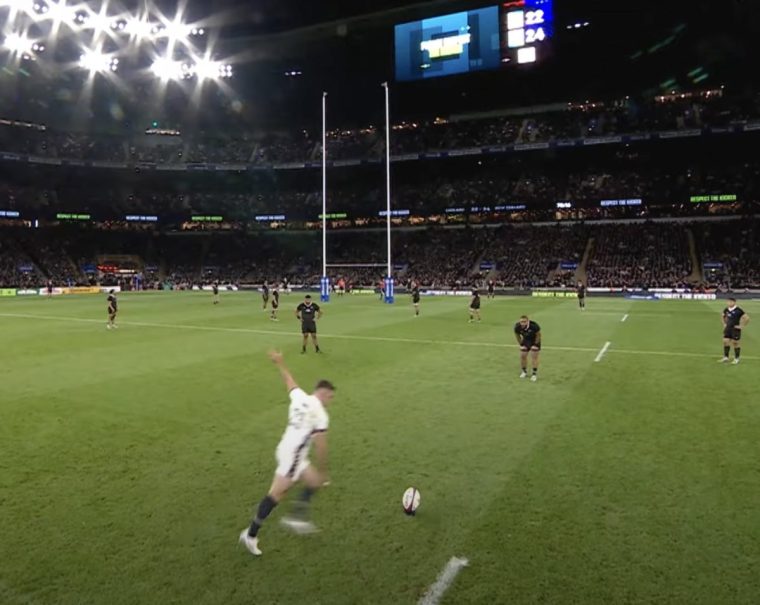
[ad_1]
TWICKENHAM — Opportunities to beat New Zealand at rugby do not come along very often.
England haven’t done it since 2012 at home, and only once away in that period – at the World Cup five years ago.
With less than 15 minutes left on Saturday, England led by eight points and would quite reasonably have expected to bag that long-awaited win in front of nearly 82,000 fans at Twickenham.
But in the end the All Blacks did what the All Blacks do: they found a way to win. However, they were helped by a series of moments in which England will think they should have done a lot better.
As Steve Borthwick said: “We gave them a window to get back, and they took it.”
Here’s where England went wrong:
1. Wasted first-half dominance
By half-time, a sloppy New Zealand had given away eight penalties to England’s solitary one, but the home side were still trailing by two points.
Four of those infringements were directly punished by Marcus Smith’s boot, but England had no try to show for their superiority, and on at least one occasion gifted possession back to New Zealand by missing touch.
When they did find it, Scott Barrett and later Patrick Tuipulotu were nuisances at the line-out: while England did not technically lose any against the head, they were unable to execute clean ball and lost an attacking platform for try-scoring opportunities on multiple occasions, because they were having to deal with scrappy possession.
Additionally, twice in the first half Smith opted for a drop-goal – missing both – when England were going through the phases in the 22.
England did not give away a breakdown penalty for 71 minutes. Why they did not back themselves to score in fives and sevens in the Kiwi 22 is a mystery.
2, 3, 4. Three huge defensive errors
In total, England missed 24 tackles across the 80 minutes, but three moments stood out, each costing a try.
Firstly, George Furbank fails to prevent player of the match Wallace Sititi offloading. Tommy Freeman has partially stopped the flanker, and Furbank appears to make a good decision to come in from the wing, leaving Mark Tele’a in a bid to prevent the offload.
The pass along the red line looks impossible with Furbank going high (Credit: TNT Sports/i)
However, Furbank gets his right arm under Sititi’s, rather than on or over it, allowing the forward to pop the ball out the side and leave Tele’a with a straightforward finish.
Borthwick was quick to defend Furbank, asking: “How many offloads have you seen like Sititi’s? It’s pretty good. He’s a pretty good player.”
 Furbank’s fractional error allows Sititi to slip the ball out to No 14 Tele’a (Credit: TNT Sports/i)
Furbank’s fractional error allows Sititi to slip the ball out to No 14 Tele’a (Credit: TNT Sports/i)
Minutes later, England’s entire defensive line is guilty of failing to recognise or react to Beauden Barrett’s admittedly inspired switch of play. As shown below, England’s disrupted defensive line are distracted by the three potential receivers in yellow, one solo and two in three-man pods; all of them are clapping, shouting and waving.
 Barrett and Jordan (red) surged through gap as the pods (yellow) distracted England (Credit: TNT Sports/i)
Barrett and Jordan (red) surged through gap as the pods (yellow) distracted England (Credit: TNT Sports/i)
Meanwhile, Barrett has spotted prop Ellis Genge isolated on the blindside of the ruck and quietly sprints across the field to switch the play and send Will Jordan in for the second try of the game. No England defender seems to react before it is far too late.
And finally, the decisive try comes when George Ford finds himself defending on the wing. A delayed pass from Damian McKenzie had already drawn Ford further inside than would have been ideal, but from this position he would still expect to make the tackle, or at least hold Tele’a up long enough for the covering Freeman or Maro Itoje to help bundle him into touch.
 Tele’a wriggled past, or even through, Ford from 10 metres out (Credit: TNT Sports/i)
Tele’a wriggled past, or even through, Ford from 10 metres out (Credit: TNT Sports/i)
Instead, Ford gets a forearm to the chest and goes backwards as the prolific winger adds his second try of the day.
5. Marcus Smith’s exit
Some would argue Ford should not even have been on the pitch. England appeared to be controlling the game with Smith and Ben Spencer at half-back, only for both to be hauled off and replaced with 18 minutes to go.
Borthwick struggled to admit it was an error or defend his decision.
“I think when you’ve got players the calibre of those guys, the guys that came off the bench, the threat that Harry Randall is and the experience that George Ford brings…” he said.
“Ultimately we were in a position to win that game, and so you got to always respect the opposition there. New Zealand are a quality side.”
He added: “Credit to them, we’ll be better next week.”
Straightforward penalty miss
And it was Ford and Randall’s combination that cost England. Ford would be a huge favourite to make the penalty kick from the position he found himself in, with neither distance nor angle an overwhelming problem.
McKenzie’s conversion a minute earlier, from the right touchline, was a far tougher kick. He made his and Ford missed his. On such things are games won and lost.
 Ford struck the right-hand post from a straightforward position (Credit: TNT Sports)
Ford struck the right-hand post from a straightforward position (Credit: TNT Sports)
Bungled drop goal
But Ford had a chance at a reprieve after a New Zealand knock-on, only for England’s meticulous planning to go to pieces.
“We’re a team that covers a lot of detail, and we’ve spoken about being in that exact position, we’ve walked through being in that exact position, and we actually felt like we were in control of it,” said captain Jamie George.
“We kept attacking. That’s the thing that we made sure that we focused on, and learned a bit from New Zealand in the summer was that we probably stopped attacking a little bit.”
But his words did not ring true. England’s carries into contact as they manipulated the ball to get Ford, a noted drop-goal kicker, into a central pocket lacked conviction and the All Blacks won hit after hit, making it increasingly difficult to set Ford up.
WHAT A MATCH! 😱
George Ford had the chance to win it with a drop goal but pushes it wide and the All Blacks claim the win!#AutumnNationsSeries | #ENGvNZL pic.twitter.com/rV8qYW2Jf3
— Rugby on TNT Sports (@rugbyontnt) November 2, 2024
“It was utter chaos,” Matt Dawson, who threw the pass in 2003 that preceded Johnny Wilkinson’s World Cup-winning drop-goal, said on BBC Radio 5 Live.
“All it needed was the composure from George Ford but you cannot put the blame on him. It was a terrible pass under pressure.”
And that rather summed it up. England won the first 60 minutes of the game. But when the pressure came on in the final quarter, they buckled. New Zealand meanwhile stood up to be counted. Under pressure, they showed cool heads and elite execution. England will have to learn.
[ad_2]
Copyright for syndicated content belongs to the linked Source link

